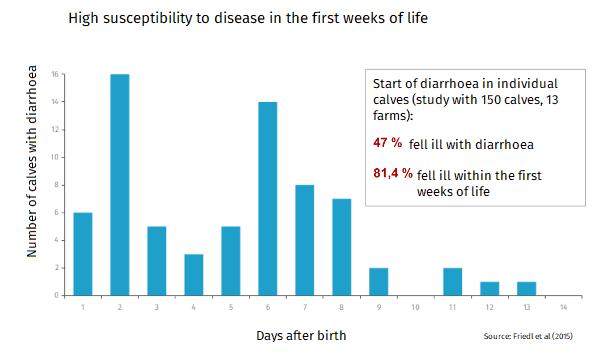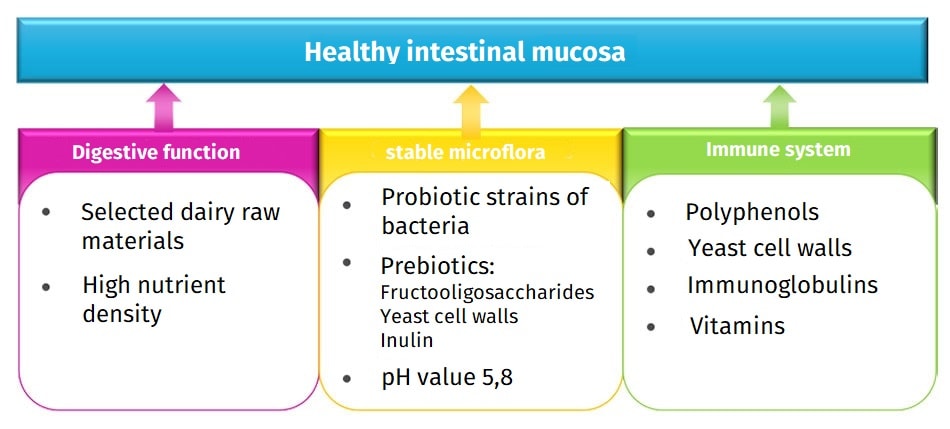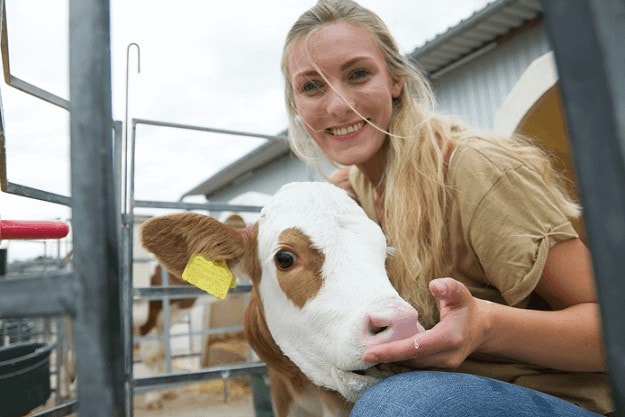Table of Contents:
- What’s IgluVital?
- IgluVital – a video that explains everything
- Why IgluVital?
- In which aspects does IgluVital differ from other products?
- How does IgluVital support the most important intestinal functions of my calf?
- What advantages do my calves have from IgluVital?
- What advantages does the farmer have by using IgluVital?
- How and when do I use IgluVital?
What’s IgluVital?
JOSERA IgluVital is a new premium milk replacer with carefully selected raw materials, pro- and prebiotics as well as immunoglobulins. The recipe is tailored to the needs of the newborn calf and provides maximum safety for the young calf.
Due to the specific recipe components IgluVital precisely focuses on the development of a healthy intestinal mucosa membrane as the basis for a good functioning digestive system in addition to an optimal nutrient supply.
Why IgluVital?
The calf of today will be the dairy cow of tomorrow! However, rearing losses are often over 10 %. Studies show that more than 80 % of diarrhoeal diseases occur within the first two weeks of life.
This can be explained by the fact that calves are born into a germ-contaminated environment without any immune protection. Germs also enter the sensitive digestive system through feeding practices. Therefore, the goal in the first weeks of life must be to build up a stable intestinal flora as well as a rapid development of the intestine through optimal nutrition.

In which aspects does IgluVital differ from other products?
IgluVital contains …
- an extended immunoglobulin supply
Specific antibodies bind locally pathogenic germs in the intestine and reduce the disease pressure against the most important diarrhoea pathogens. - a pre- and probiotic equipment
These create a stable intestinal flora. The contained bacterial strains ensure a dominance with desired microbes and suppress pathogenic germs. In addition, the addition of prebiotics results in a better consistency of faeces and a lower risk of diarrhoea. - Polyphenols
These are secondary plant substances that have a positive influence on the inflammatory processes in the intestinal mucosa and in the body. - Yeast cell walls
These bind harmful enterobacteria and protect against bacterial infections. At the same time they stand for a high diarrhoea safety and improve the health status of your calf.
How does IgluVital support the most important intestinal functions of my calf?

What advantages do my calves have from IgluVital?
- The four important intestinal functions are promoted:
1. the intestinal flora
2. the immune system
3. digestion
4. the healthy intestinal mucosa - Optimal nutrient supply in the first weeks of life
- Building a stable immune system
- Polyphenols with anti-inflammatory activity
- Selected raw materials with highest digestibility
- Pre- and probiotics to support the intestinal flora
What advantages does the farmer have by using IgluVital?
- Healthy and robust calves
- Security against early diarrhoea
- High daily weight gains and problem-free rearing
- Needs-based and cost-efficient rearing in combination with a second-phase milk replacer
Franziska Grulich also successfully uses IgluVital. Watch the video or read more about the success story here:
How and when do I use IgluVital?
- Main area of application

- suitable for automatic feeding
- Usage recommendation:
160 g/l water 140 g/l prepared milk replacer
In intensive rearing, the concentration can be increased up
to 180 g/l of water, when the calf has access to fresh water. - Preparing the milk replacer in a bucket/milk taxi:
Put 1/3 of the required water amount (45 – 50 °C) into the
container (bucket, tank).
While stirring add the milk replacer powder – 140 g/l milk
replacer.
Add the remaining water (2/3). The drinking temperature of
the milk replacer should be at 40°C. - Settings for the automatic feeder:
160 g/l water 140g/l milk replacer
You might be interested in the following contents:
Calf rearing made easy
Optimum calf rearing has a positive effect on the development and performance of the later dairy herd and thus forms the basis for successful dairy farming. Especially in the first weeks of life, the calves are very susceptible to husbandry, management and feeding errors.
Respiratory diseases in calves!
The cold season is upon us again. Respiratory diseases, such as coughs and pneumonia, are becoming increasingly common. The consequences are slower weight gain, additional expenditure for treatments and a longer rearing period.






 (1 Votes, average: 5.00 von 5)
(1 Votes, average: 5.00 von 5)